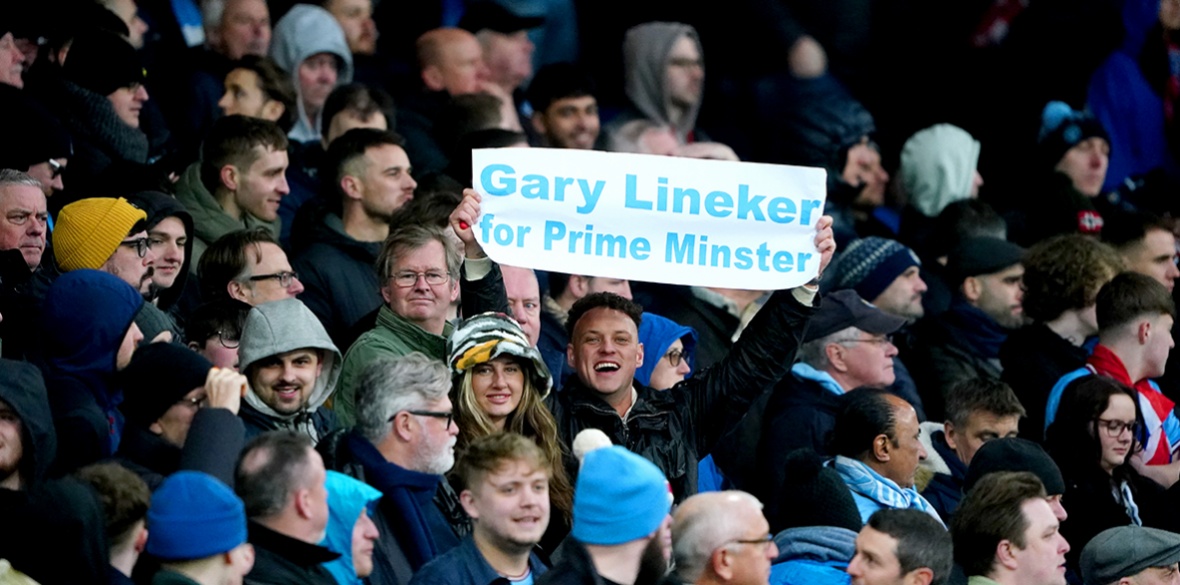THE BBC’s climbdown over Gary Lineker is a victory for solidarity that could hardly come at a worse time for the Tories.
The corporation has been humiliated by the “one out, all out” stand taken by Match of the Day presenters — and Lineker’s own statement thanking his supporters made sure to highlight again the plight of those forced to “flee [their] homes from persecution or war to seek refuge in a land far away.”
The swift impact of sports journalists’ decision to boycott Match of the Day until Lineker was back is due to their unusual prominence, of course — but the message that a united workforce can beat the boss will hardly be lost on viewers in a week that sees hundreds of thousands of public servants take strike action.
Nor will the BBC’s gushing assurances that it respected the presenters’ stance sit easily with the barrage of propaganda being deployed against ordinary workers who have voted to walk out.
The Lineker saga has got the public’s attention. We should seize the opportunity to promote its lessons.
First, the footballer has challenged the Establishment narrative that asylum-seekers are a threat who need to be repelled.
That is not just a Tory narrative, though Tory plans are so extreme — with Chancellor Jeremy Hunt declining even to rule out the incarceration of child refugees — that even Suella Braverman’s immigrant-bashing predecessor Priti Patel is reported to have concerns.
But Lineker’s focus on the suffering of refugees exposes too the unprincipled politicking of the Labour Party, whose leader Sir Keir Starmer criticises the government for failing to deport enough Albanians and complains that asylum-seekers “sit in hotels and digs for months on end at taxpayers’ expense” at a time when far-right thugs are mobilising to target such places.
The labour movement is growing, especially for unions showing they can take on the government and deliver on strikes — the 50,000 people who have joined the National Education Union since its strike vote are a case in point.
Support for striking workers on picket lines has been tremendous and community mobilisation in support of strikes provides a platform to spread the news about industrial disputes (including the huge number of workplace wins being chalked up by unions like Unite and GMB) free from the distortions of the big broadcasters and newspapers.
They can be platforms too for the political alternative we need. At Westminster this is almost gone. The Labour-Tory anti-refugee consensus is not an outlier.
The main parties are united in opposing inflation-proof pay rises, rejecting public ownership and supporting war. So, miserably, are most of the smaller parties: the recent decision by the Green Party of England and Wales to end its opposition to Nato membership reflects a trajectory of accommodation with imperialism familiar from its counterparts in Germany and Ireland.
But we have a labour movement active and visible enough to challenge that imposed consensus.
The outpouring of support for Lineker shows a huge current of public opinion appalled by the demonisation of refugees. As in 2017, when Jeremy Corbyn’s speech detailing the links between British foreign policy and terrorist attacks met broad public agreement, we have had a sudden glimpse of popular sentiment not reflected in our political system or its media mouthpieces.
That should give socialists courage to confront the system and argue for the overhaul of British state policy we need in every single field.
The huge demos planned for Budget day should become festivals of solidarity — of workers across multiple sectors who know that together they can win real pay rises; of citizens who know that the struggles of nurses, teachers, transport workers and others are battles for the future of the services they provide; of a labour movement that extends the hand of friendship to anyone in need, including those who come to this country seeking safety.











